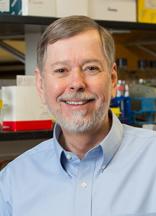Areas of Interest
Our research focuses on the areas of genome instability and the molecular biology of human genetic disease. A longstanding interest is the study of chromosomal fragile sites, which are loci that are especially sensitive to breakage following replication stress. Our studies of fragile sites have led to our current focus on copy number variants (CNVs). In only the last few years, thousands of normal CNVs spanning tens to hundreds of kb have been found in the human genome where they play important roles in normal genomic variation and evolution. In addition, de novo CNVs are a major cause of genetic and developmental disorders, including mental retardation, autism, schizophrenia, epilepsy, skeletal defects and others. Despite their importance, there is limited understanding of how most CNVs arise and the risk factors involved. We developed a novel in vitro model system to study the genetic and environmental causes of de novo CNV mutation formation in human cells and discovered that cellular exposure to inhibitors of DNA replication lead to a high frequency of CNVs resembling most polymorphic variants, de novo germline CNVs and CNVs arising in cancers. Our current efforts are focused on expanding on these findings to identify the genetic and environmental factors involved in CNVs formation using novel assays both in vitro and in mice in vivo and high-resolution genome analysis approaches. Our recent findings link CNV formation to conflicts between replication and transcription opening the way to new questions and approaches.
Our second major interest is Hutchinson-Gilford Progeria (HGP). HGP is characterized by the premature onset of many of the features associated with aging, such as an aged appearance and arteriosclerosis, with death usually before age 15. We were involved in a consortium effort that identified the gene (lamin A/C) responsible for this fascinating disorder, opening the door to functional studies and the identification of therapeutic drug trials. Our current interests include the role of lamin A in genome stability and the identification of genes responsible for related progeroid disorders.
Honors & Awards
- Distinguished Faculty Lectureship Award in Biomedical Research, University of Michigan Medical School, 2018
- Elected Fellow, American Association for the Advancement of Science (AAAS), 2018
- NIH New Investigator Award, 1985
- NIH Shannon Award, 1991
- March of Dimes Birth Defects Foundation Research Advisory Board 1998-2003 and 2013-present
- NIH, MGM/GHD Sections 1992, 1997, 1999 - 2001, 2005, 2006
- Medical School Executive Committee, University of Michigan, Ann Arbor, MI 2002-2005
- Distinguished Faculty Achievement Award, University of Michigan, 2005
- Progeria Research Foundation, Medical Research Board 2005-present:
Published Articles or Reviews
Selected Publications from 158 Peer-Reviewed:
Casper AM, Nghiem P, Arlt MF, Glover TW. ATR regulates fragile site stability. Cell, 111: 779-789, 2002. PMID: 12526805.
Eriksson J, Brown WT, Gordon LB, Glynn MW, Singer J, Scott L, Erdos MR, Robbins CM, Berglund P, Dutra A, Pak E, Durkin S, Csoka AB, Boehnke M, Glover TW, Collins FS: Recurrent de novo point mutations in lamin A cause Hutchinson-Gilford progeria syndrome. Nature 423: 293-298, 2003. PMID: 12714972.
Arlt MF, Xu B, Durkin SG, Casper AM, Kasta MB, Glover TW. BRCA1 is required for common-fragile-site stability via its G2/M checkpoint function. Mol Cell Biol 24: 6701-6709, 2004. PMCID: PMC444841.
Howlett NG, Taniguchi T, Durkin SG, D’Andrea AD, Glover TW: The Fanconi anemia pathway is required for the DNA replication stress response and for the regulation of common fragile site stability. Hum Mol Genet 14: 693-701, 2005. PMID: 15661754.
Glynn MW, Glover TW: Incomplete processing of mutant lamin A in Hutchinson-Gilford progeria leads to nuclear abnormalities, which are reversed by farnesyltransferase inhibition. Hum Mol Genet 14: 2959-2569, 2005. PMID: 16126733.
Durkin SG, Ragland RL, Arlt MF, Mulle JG, Warren ST, Glover TW. Replication stress induces tumor-like microdeletions in FHIT/FRA3B. Proc Natl Acad Sci USA 105: 246-251, 2008. PMC2224195.
Arlt MF, Mulle JG, Schaibley VM, Ragland RL ,Durkin SL, Warren ST, Glover TW. Replication stress induces genome-wide copy number changes in human cells that resemble polymorphic and pathogenic variants. Am J Hum Genet 84: 339-350, 2009. PMC2667984
Arlt MF, Ozdemir AC, Birkeland SR,Arlt MF, Ozdemir AC, Birkeland SR, Wilson TE, Glover TW. Hydroxyurea induces de novo copy number variants in human cells. PNAS 108:17360–65, 2011. PMC3198378
Arlt M, Rajendran S, Birkeland SR, Wilson, TE, Glover, TW. De novo CNV formation in mouse embryonic stem cells occurs in the absence of Xrcc4-dependent nonhomologous end joining. PLoS Genetics, e1002981, 2012. PMC3447954
Arlt MF, Rajendran S, Birkeland SR, Wilson TE, Glover TW. Copy number variants are produced in response to low-dose ionizing radiation in cultured cells. Environ Mol Mutagen 55:103-113,2013. PMC4086151
Wilson TE, Arlt MF, Park SH, Rajendran S, Paulsen M, Ljungman M, Glover TW: Large transcription units unify copy number variants and common fragile sites arising under replication stress. Genome Res 25(2): 189-200, 2015. PMID: 25373142/PMC4315293
Glover TW, Wilson TE, Arlt MF: Fragile sites in cancer: more than meets the eye (peer-reviewed review) Nat Rev Cancer 17(8): 489-501, 2017. PMID: 28740117

